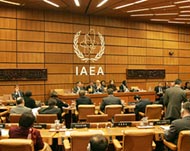UN atomic agency chief re-elected
The UN atomic agency has unanimously re-appointed Mohamed ElBaradei as its chief after Washington dropped its opposition to a man who had questioned US weapons intelligence on Iraq.

ElBaradei told reporters in the Austrian capital Vienna on Monday he was “humbled and awed” at his appointment by consensus to a third term as director-general of the International Atomic Energy Agency (IAEA) and said he expected to be able to work well with the US, which has also criticised him for being too soft on Iran.
ElBaradei said that when he had met in Washington last week with US Secretary of State Condoleezza Rice, “We did not discuss the past. We did not discuss my election. We looked together forward. We agreed we have a lot of common objectives.”
“We need to stem the proliferation of nuclear weapons. We need to ensure the authority of the agency in terms of verification. We need to have better control over the sensitive (nuclear) fuel cycle (in countries worldwide) and we need to have a more efficient compliance mechanism (with safeguards of the nuclear Non-Proliferation Treaty),” ElBaradei said.
Consensus reached
The IAEA’s 35-nation board of governors “has reached consensus and appointed Dr ElBaradei to a third term”, IAEA spokeswoman Melissa Fleming told reporters. The decision is to be confirmed at an IAEA general conference in September.
The vote was held up for some six hours by Japan’s objections to making it the first agenda item in a week-long board meeting that opened Monday but once this procedural issue was resolved the consensus decision took place almost immediately.
 |
|
The IAEA’s board of governors |
The US had set the stage for this when it last week reversed its opposition to ElBaradei and said it was ready to accept a third term for him despite past policy disagreements over both Iraq and Iran.
ElBaradei, 62, has said the “jury is still out” on Iran’s intentions, even if IAEA inspectors have discovered that Iran hid sensitive atomic work for almost two decades until the agency’s inspection of its programme began in 2003.
Onus on Iran
ElBaradei said Monday that he will tell the board when he reports to it Tuesday that Iran has “respected its commitment with regard to suspension of the fuel cycle activities.”
But he said he would also report that the IAEA needs information “on the issue of the extent and nature of the centrifuge programme”, referring to Iran’s working with sophisticated versions of the machines that enrich uranium.
|
“The ball is very much in Iran’s court. The sooner they have provided us the information they need, the sooner we will be able to clarify outstanding issues” Mohamed ElBaradei, |
ElBaradei said that closing the investigation, as Iran wishes, depends on Tehran.
“The ball is very much in Iran’s court. The sooner they have provided us the information they need, the sooner we will be able to clarify outstanding issues,” ElBaradei said.
Centrifuge parts
ElBaradei said the IAEA was making “progress with regard to the contamination issue”.
The agency is working to establish whether highly enriched uranium its inspectors have found in Iran is from imported equipment, as Tehran claims, or from Iranian manufacture of such potentially weapons-grade nuclear material.
A diplomat close to the IAEA said the tests on centrifuge parts supplied by Pakistan tend so far to support Iran’s claim that the contamination was from imported equipment.
But the diplomat said the tests have not been concluded.